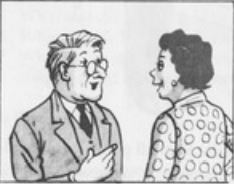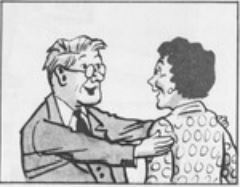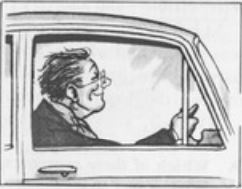
midnight meal
 المؤلف:
L.A Hill
المؤلف:
L.A Hill
 المصدر:
Advanced steps to understanding
المصدر:
Advanced steps to understanding
 الجزء والصفحة:
60-1
الجزء والصفحة:
60-1
 10/9/2022
10/9/2022
 1253
1253

Mr. Joes had to drive up from London to Edinburgh in Scotland.
"I'm going to drive at night," he said to his wife. The roads will be quieter. And if I get hungry, I'll stop at one of the small restaurants at the side of the road and have something to eat.'
"The food's terrible in those places, I believe,' his wife said.
"Oh, well, I don't suppose it will kill me,' Mr. Jones said, laughing. He left at 9 o'clock in the evening, and at about midnight he felt hungry, so he stopped at a small restaurant which was open all night and sat down at a table. A waiter came to him, and Mr. Jones asked for ham and eggs.
"And,' he said to the waiter, 'I like my eggs almost raw, and my ham quite cold.
The waiter laughed and said, 'You must have eaten here before!
A Which of these sentences are true (T) and which are false (F)? Write T or F in the boxes.
- The roads between London and Edinburgh were busiest at night.
- The restaurants at the side of the road were not open at night.
- Mr. Jones did not think the food in them was good but Mrs. Jones did.
- Mr. Jones felt hungry about three hours after he set off.
- Mr. Jones asked for eggs and ham.
- The waiter thought that Mr. Jones had eaten there before.
B Answer these questions.
- Why did Mr. Jones prefer to make his journey at night?
- Where was he going to eat, if necessary?
- What did his wife say about that?
- What did he answer?
- What happened at about midnight?
- What did Mr. Jones ask for?
- What did he add after that?
- What did the waiter do and say when he heard this?
C Write the sentence under each picture. Choose the correct word in each.

1. Mr. Jones knew that he was going to be hungry, and he said that he would stop at a small restaurant (if, when) he wanted to eat something.

2. Mr. Jones did not know whether he was going to be hungry, but he said that he would stop at a small restaurant (if, when) he wanted to eat something.

3. Mr. Jones ate some bad ham. And (if, when) he had eaten it, he felt very ill.

4. Mr. Jones didn’t eat the bad ham. (if, when) he had eaten it, he would have felt very ill.
 الاكثر قراءة في Advanced
الاكثر قراءة في Advanced
 اخر الاخبار
اخر الاخبار
اخبار العتبة العباسية المقدسة


